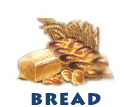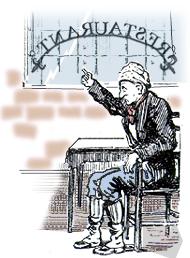

| We
bring you here a short dream-like excerpt from S.Y. Agnon's story
"A Whole Loaf." The story, published in periodicals in the 1930s,
formed part of The Book of Deeds. The ostensibly mundane
situation in which the protagonist finds himself, offers the reader
cues that suggest broader spiritual implications. The story is followed
by comments by Alan Mintz and Anne Golomb Hoffman.
|
A
WHOLE LOAF
(translated
by I.M. Lask)
After an
hour, or maybe a little less, a waiter arrived and bowed and asked, "What
would you like, sir?" What would I like and what wouldn't I like! I showed
him the bill of fare and told him to fetch me just anything. And in order
that he should not think me the kind of boor who eats anything without selecting
it, I added to him gravely, "But I want a whole loaf." The waiter nodded his
head and said, "I shall fetch it for you at once. I shall fetch it for you
at once."
 I
sat waiting until he came back with it. He returned carrying a serving
dish with all kinds of good things. I jumped from my place and wanted
to take something. He went and placed the food in front of somebody
else, quietly arranged thing separately in front of him, and chatted
and laughed with him, nothing on his list all kinds of drinks which
the fellow was ordering for his repast. Meanwhile he turned his face
toward me and said, "You want a whole loaf, don't you, sir? I am bringing
it at once." I
sat waiting until he came back with it. He returned carrying a serving
dish with all kinds of good things. I jumped from my place and wanted
to take something. He went and placed the food in front of somebody
else, quietly arranged thing separately in front of him, and chatted
and laughed with him, nothing on his list all kinds of drinks which
the fellow was ordering for his repast. Meanwhile he turned his face
toward me and said, "You want a whole loaf, don't you, sir? I am bringing
it at once."
Before long he came back with an even bigger tray than the first one.
I understood that it was meant for me and told myself, that's the meaning
of the saying: "The longer the wait, the greater the reward." As I prepared
to take something, the waiter said to me, "Excuse, me sir, I'm bringing
you yours at once." And he arranged the food in front of a different
guest most carefully, just as he had done before.
I kept myself under control and did not grab anything from others. And
since I did not grab anything from others I told myself, Just as I don't
grab from others, so others won't grab my share. Nobody touches what's
prepared for somebody else. Let's wait awhile and we'll get what's coming
to us, just like all the other guest who came before me; for it's first
come, first served.
The waiter returned. Or maybe it was another waiter and, because I was
so hungry, I only thought it was the same one. I jumped from my chair
in order to remind him of my presence. He came and stood and bowed to
me as though mine were a new face. I began wondering who this waiter
could be, a fresh fellow or the one from whom I had ordered my food;
for if he were a fresh waiter, I would have to order afresh, and if
it were the same one, all I had to do was to remind him. While I was
thinking it over, he went his way. A little later he returned, bringing
every kind of food and drink, all for the fellows sitting to the right
or the left of me.
Meanwhile fresh guests came and sat down and ordered all kinds of food
and drink. The waiters ran and brought their orders to them. I began
to wonder why they were being served first when I had been there before
them. Maybe because I had asked for a whole loaf and you could not get
a whole loaf at present, so they waiting till they could get one from
the baker. I began to berate myself for asking for a whole loaf, when
I would have been satisfied with even a small slice.
*
* *
About S.Y.
Agnon and A Whole Loaf, by Alan Mintz and Anne Golomb Hoffman
Throughout his long career, Nobel Laureate in Literature S.Y. Agnon (1888-1970)
fashioned and refashioned the myth of himself as a writer. He told the story
of his upbringing in Galicia, his journey to the Land of Israel, his extended
sojourn in Germany, and his return to Jerusalem in many different versions,
placing the persona of the writer at times at the center of the story and at
times at the margins as a kind of ironic scaffolding... He shaped the narrative
of his own beginnings to produce an image of the artist as a figure at once
solitary and part of a community, both a rebel and a redeemer....
"A Whole Loaf" organizes itself around a conflict. The protagonist is caught
between the desire to fill his belly after a day without food and the obligation
to mail the letters entrusted to him by Dr. Yekutiel Ne'eman. The letters of
Dr. Ne'eman carry with them the potential to bring words of cure to those who
are ill, just as Dr. Ne'eman's book is said to have improved the lives of those
who read it. Thus, the request, that Dr. Ne'eman makes of the narrator —
to deliver his letters to the post office before it closes —
carried with it the sense of a higher ethical mission....
The story is replete with cues that invoke the broader framework of communal
values and traditions, but in a way that makes them part of the situation of
a modern everyman. That everyman is a fellow who wants to sit down and enjoy
a good meal but is impeded in fulfilling his wish by a commission that recalls
him to a spiritual dimension he is in danger of forgetting. Imaginative participation
in this conflict does not require any particular acquaintance with Jewish learning.
Some awareness of what Agnon has packed into the text, however, gives the reader
access to a kind of learned gamesmanship that the text conducts with rabbinic
injunctions and midrashic tales. Agnon is a master of this kind of erudite fun,
and nowhere is it better illustrated than in "A Whole Loaf."
Consider the title of the story. What is this "whole loaf"? Is Agnon reminding
us that the Sabbath blessing over bread may be recited only over a loaf that
is whole, not cut? Are we meant to interpret the phrase in light of the rabbinic
injunction to make a Sabbath blessing over two loaves? Or should we interpret
the whole loaf as an indication of the greedy and egotistical nature of the
narrator who will settle for nothing less than a "whole loaf"? Agnon is playing
a particular kind of teasing game here, in which hints at rabbinic sources add
an additional dimension to our reading.
|
 From:
A Book that was Lost and other Stories by S.Y. Agnon, edited and
introductions by Alan Mintz and Anne Golomb Hoffman.
© Schocken
Books, 1995. Reprinted with the permission of the publisher. From:
A Book that was Lost and other Stories by S.Y. Agnon, edited and
introductions by Alan Mintz and Anne Golomb Hoffman.
© Schocken
Books, 1995. Reprinted with the permission of the publisher.
|
BREAD
Table of Contents
|